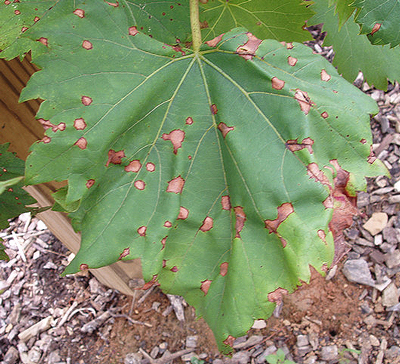September 17, 2020 - By Brian David (U.C. Master Gardener, Mariposa) - We know that wildfire smoke affects people’s health. Particles of burned plants and trees land on dust particles  and are breathed into the lungs. However, this year’s Creek Fire not only affects you, it affects your plants.
and are breathed into the lungs. However, this year’s Creek Fire not only affects you, it affects your plants.
This summer’s Sierra foothill smoke has limited gardening in part by imposing health restrictions on gardeners. In areas that were evacuated, it meant plants went without care outside conscientious acts of firefighters. Power outages, which often accompany wildfires, often result in irregular watering.
Plants, like people, need clean air for optimal health. The effects of smoke on plants can be tasted in fruits like grapes; wines produced from grapes developing during a wildfire will often have a smoky taste. Air pollution effects on plants have been documented since the 1940’s, decreasing crop production and impacting the financial return on commercially grown produce. A combination of particulate matter and the low-lying ozone (O3) created by burning fossil fuels, can reduce yields of plants and trees by twenty percent.
Wildfire smoke may slow the development of garden plants or cause stress on their leaves. You may have smoke stressed plants if you find leaves losing their green color (chlorosis), leaf cell injury or death in the leaf (necrosis), irregular small dark spots on the leaves (stipples), brown, bronze or red sections on the leaf may also be the result of the plant’s pores (stoma) being overloaded with particles and ozone from the smoke.
 Stressed Leaf - Photo credit: UCANR
Stressed Leaf - Photo credit: UCANR
Wildfires often require sprayed fire retardants to slow a fire. Long Term Fire Retardant (LTFR) is often composed of phosphates, sulfates, nitrogen, and water. These elements suffocate the fire and fertilize the forest. The LTFR’s also alter the natural forest growth and wash into water ways increasing aquatic plant growth, which impacts aquatic animal development and survival. The best thing we can do for an environment with poor air quality is to grow more herbaceous plants.
Fall gardening in the Mother Lode can be like discovering green gold. Now is the time to prepare for your garden’s bright future. Soon rains will fall. The air will be clear, and the land will revive. Planting our fall crops now allows their roots to drive deep into the soil maximizing fall and winter watering for vibrant foliage.
Consider planting nutrient dense vegetables like beets, broccoli, Brussels sprout, cabbage, carrots, cauliflower, collards, radish, kale, lettuce, and mustard greens. Flowers like calendulas, primrose, snap dragons, and pansies will color your fall garden. Spring maturing bulbs like narcissus, daffodils and brodiaea can go in now and do not need watering.
For assistance, contact our Helpline at (209) 966-7078 or at mgmariposa@ucdavis.edu. We are currently unable to take samples or meet with you in person but welcome pictures.
The U.C. Master Gardener Helpline is staffed; Thursdays from 2:00 p.m. - 5:00 p.m.
Serving Mariposa County, including Greeley Hill, Coulterville and Lake Don Pedro
Please contact the helpline, or leave a message by phone at: (209) 966-7078
By email (send photos and questions for researched answers) to: mgmariposa@ucdavis.edu
For further gardening information and event announcements, please visit: UCMG website: http://cemariposa.ucanr.edu/Master_Gardener
Follow us on Facebook at: https://www.facebook.com/mariposamastergardeners
Master Gardener Office Location:
UC Cooperative Extension Office,
5009 Fairgrounds Road
Mariposa, CA 95338
Phone: (209) 966-2417
Email: mgmariposa@ucdavis.edu
Website: http://cemariposa.ucanr.edu/Master_Gardener
Visit the YouTube channel at UCCE Mariposa.









